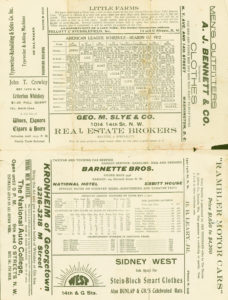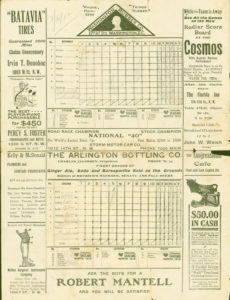Did you know that today - Thursday, March 28, 2019 - is the earliest Opening Day in the history of Major League Baseball?
These pages are from a Washington Nationals game against the Chicago White Sox on July 16, 1912, attended by a member of the Olcott family from the Glencarlyn neighborhood.
The first page has the 1912 American League schedule and 1911 standings, while the second page has a score card and roster for the competing teams. The Washington Nationals/Senators beat the Chicago White Sox 7-2 in the July 16 game and finished second in the 1912 American League, losing the Pennant to the Boston Red Sox.
The Washington area may have a fraught history when it comes to baseball teams, but that has not stopped Arlingtonians from cheering for our local team - whatever their name may be.
The Washington Senators—one of the American League’s charter teams—was founded in 1901. In 1905, the team officially changed its name to the Washington Nationals, but was still commonly referred to as the “Senators” until it relocated to Minnesota in 1961, where it became the Twins. The original Nationals/Senators team was almost immediately replaced with another American League team, this time officially named the Washington Senators. The Senators lasted for a decade (1961-1971) before moving to Texas as the Texas Rangers. In 2005—33 years after the Senators departed for Texas—Major League Baseball finally returned to the Washington area, this time as part of the National League and as the Washington Nationals.
So go out this weekend and cheer for your favorite team. We’ve got our Nats caps ready!
To see more items like these, or to learn more about Arlington's history, visit the Center for Local History on the first floor of the Central Library.
Do you have a question about this story, or a personal experience to share?
Use this form to send a message to the Charlie Clark Center for Local History.
Center For Local History - Blog Post Message Form
Do you have a question about this story, or a personal experience to share? Use this form to send a message to the Center for Local History.
"*" indicates required fields

